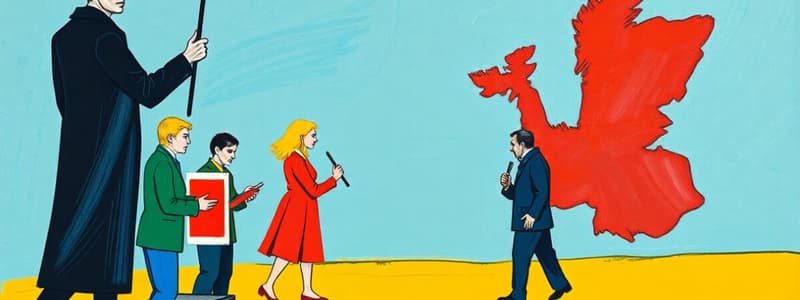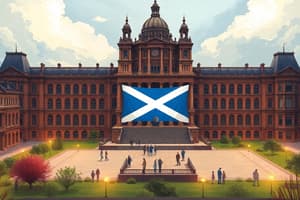Podcast
Questions and Answers
What political rights do people in Scotland have?
What political rights do people in Scotland have?
People in Scotland have the right to vote in elections, participate in decision-making processes, and enjoy freedom of speech and assembly.
What are the key features of democracy in Scotland?
What are the key features of democracy in Scotland?
Key features of democracy in Scotland include free and fair elections, representation through the Scottish Parliament, the rule of law, and protection of individual rights.
What are the devolved powers of the Scottish Government?
What are the devolved powers of the Scottish Government?
The devolved powers include education, health, environment, justice, and transport, allowing Scotland to legislate on these matters.
What roles do MSPs have in their constituencies?
What roles do MSPs have in their constituencies?
What roles do MSPs have in the Scottish Parliament?
What roles do MSPs have in the Scottish Parliament?
Why are women under-represented in the Scottish Parliament?
Why are women under-represented in the Scottish Parliament?
Why are ethnic minorities under-represented in the Scottish Parliament?
Why are ethnic minorities under-represented in the Scottish Parliament?
Flashcards are hidden until you start studying
Study Notes
Political Rights in Scotland
- Right to Vote: All Scottish residents aged 16 and over have the right to vote in Scottish Parliament elections.
- Right to Stand for Election: Anyone meeting eligibility criteria can stand for election to the Scottish Parliament.
- Right to Freedom of Speech: Scotts have the freedom to express their opinions and views, even if they criticize the government or its policies.
- Right to Assembly and Association: People can peacefully gather and form groups to advocate for their rights and interests.
- Right to Access to Information: People have the right to access information held by the Scottish Government, under the Freedom of Information (Scotland) Act 2002.
Key Features of Democracy in Scotland
- Multi-Party System: Multiple political parties compete for votes in elections, offering a range of policy positions.
- First-Past-the-Post Voting: The candidate securing the most votes in each constituency is elected to the Scottish Parliament, regardless of overall vote share.
- Proportionality through Additional Member System: Additional members are elected through a regional system of proportional representation, balancing the constituency-based vote results.
- Regular Elections: Scottish Parliament elections are held every five years, allowing voters to choose their representatives.
- Independent Judiciary: The Scottish judicial system operates independently of the Scottish Government, ensuring a fair and impartial legal system.
- Separation of Powers: Executive, legislative, and judicial branches of government are distinct, preventing one body from having undue power.
Devolved Powers of the Scottish Government
- Health and Social Care: The Scottish Parliament sets health policy, including the National Health Service (NHS) in Scotland.
- Education: The Scottish Government controls education policy, including curriculum development and funding of schools and universities.
- Justice: Scotland has its own legal system, with the Scottish Parliament responsible for legislation and the Scottish Courts Service.
- Police and Fire: The Scottish Parliament has responsibility for police and fire services in Scotland.
- Economic Development: The government has policy-making power over areas like tourism, business support, and infrastructure.
- Environment: The Scottish Government has responsibility for environmental policies, including climate change action and renewable energy.
- Culture and Sport: The Scottish Parliament supports the arts, culture, and sporting activities.
- Taxes: The Scottish Government has power over some tax policies, such as income tax and landfill tax.
Roles of MSPs in their Constituencies
- Representation: MSPs are elected by their constituents to voice their concerns and opinions in the Scottish Parliament.
- Casework: MSPs help constituents resolve issues with local services or government departments.
- Constituency Engagement: MSPs participate in community events, hold surgeries, and stay connected with their constituents.
- Advocacy: MSPs advocate for local projects and initiatives that improve the lives of their constituents.
Roles of MSPs in the Scottish Parliament
- Legislation: MSPs participate in debates, propose amendments, and vote on bills.
- Scrutiny: MSPs hold the Scottish Government to account by questioning ministers and conducting inquiries.
- Budgetary Responsibility: MSPs are involved in the approval and oversight of the Scottish Government's budget.
- Committee Work: MSPs serve on parliamentary committees that scrutinize specific policy areas.
- Debates: MSPs participate in debates on important issues, shaping public opinion and influencing policy.
Why Women are Under-Represented in the Scottish Parliament
- Gender Stereotypes: Stereotypical views of women's roles in society may unintentionally discourage women from seeking political office.
- Lack of Female Role Models: A lack of prominent female politicians in the past has impeded the development of a strong pipeline of female candidates.
- Gender Bias: Unconscious bias against women continues to affect the selection of candidates by political parties and voters.
- Work-Life Balance: The demands of political life can be challenging to balance with family responsibilities, particularly for women.
- Financial Barriers: Campaigning for election can be expensive, and women may lack the financial resources of some male candidates.
Why Ethnic Minorities are Under-Represented in the Scottish Parliament
- Lack of Diversity in Political Parties: Ethnic minority groups may not be adequately represented in the ranks of political parties, limiting their opportunities for selection.
- Discrimination and Barriers to Entry: Ethnic minorities may face systemic or unconscious bias in the political process, hindering their participation.
- Representation of Interests: Ethnic minority groups may feel their voices are not adequately represented in the political discourse, reducing their engagement with the political system.
- Language and Cultural Barriers: Ethnic minorities may face challenges related to language proficiency or cultural differences that hinder their participation in politics.
- Political System Challenges: The electoral system in Scotland may not be fully inclusive to ethnic minorities, impacting their ability to be elected.
Studying That Suits You
Use AI to generate personalized quizzes and flashcards to suit your learning preferences.



